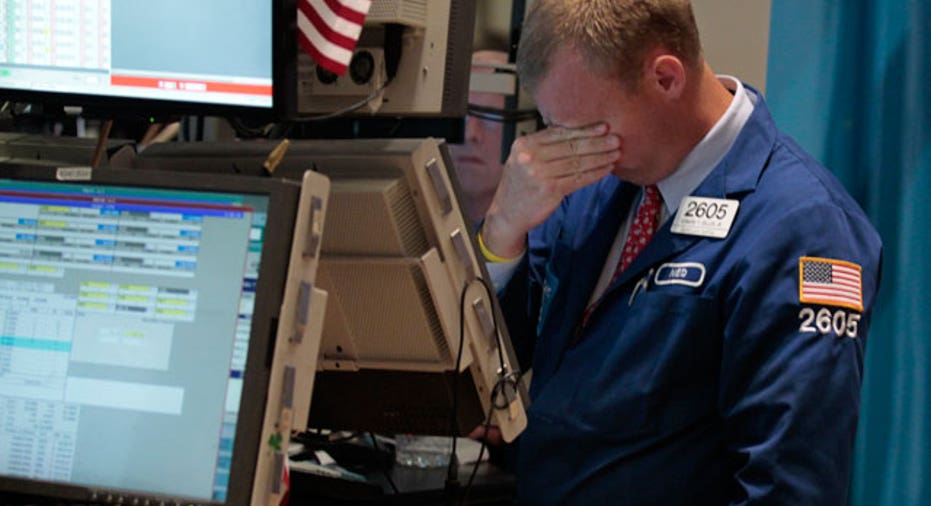Dow Comes Back From Session Lows, Nasdaq Edges Higher

FOX Business: The Power to Prosper
The markets recovered from session lows in turbulent trading on Tuesday, but the Dow remained off by 100 points, as traders focused on a slew of news from around the world.
Today's Markets
As of 11:45 a.m. ET, the Dow Jones Industrial Average fell 130 points, or 1.2%, to 10,525, the S&P 500 slid 7.2 points, or 0.65%, to 1,093 and the Nasdaq Composite rose 10.8 points, or 0.46%, to 2,347.
The S&P 500 is on the brink of bear-market territory, having crossed in and out for much of the session. The Nasdaq is points away from being in a bear market, and the Dow is more than 200 points off.
The energy sector was under the most pressure in early trading Tuesday, with stocks like oil-exploration technology company Schlumberger (NYSE:SLB) falling sharply. Financials were were pummeled as well, with shares of Bank of America (NYSE:BAC) and Morgan Stanley (NYSE:MS) falling more than 3%.
The cost to insure Bank of America's (NYSE:BAC) debt jumped to an all-time high Tuesday, while the cost of insuring Morgan Stanely (NYSE:MS) and Goldman Sachs (NYSE:GS) hit the highest levels since the depths of the financial crisis in 2008.
However, materials stocks like Freeport-McMoRan Copper (NYSE:FCX) performed considerably better than the broader markets.
The Dow has shed close to 500 points in the last two sessions alone, while the S&P 500 is off 5.3% in the same period, and the Nasdaq plummeted 8.3% in a four-day losing streak. All three indices are now at the lowest level since September 2010.
On the economic front, Federal Reserve Chairman Ben Bernanke told a joint session of Congress that the central bank sees continued weakness in the economy. Bernanke noted that manufacturing has been heating up as exports have increased, but consumer confidence remains depressed because of a stubbornly anemic labor market. Additionally, the Fed chief noted that monetary policy alone can't solve the country's economic challenge, and called on policymakers across the spectrum to step in: "Fostering healthy growth and job creation is a shared responsibility of all economic policymakers, in close cooperation with the private sector," he said in prepared remarks.
Factory orders declined 0.2% in August, worse than expectations of no change. Excluding the transportation segment, orders were also down 0.2% -- the first fall in six months.
Europe's deepening sovereign debt crisis has been weighing heavily on sentiment. News that European officials are considering re-crafting Greece's bailout package spooked traders across the globe on Tuesday: the Global Dow recently fell 1.6%, while the Euro Stoxx 50, an index that tracks euro zone blue chips, plummeted 2.9%.
Luxembourg Prime Minister Jean-Claude Juncker said Tuesday the group of euro zone ministers are considering "technical revisions" to Greece's bailout. Greece needs another tranche of rescue aid by the middle of the month to avert a bailout that many analysts worry will put the European financial system under additional strain.
"Even if the revision is 'technical', we think this would create a negative precedent, opening the door for much larger haircuts," economists at Nomura wrote in a research note, indicating that bondholders may have to take heavier losses under a redesigned bailout.
Indeed, shares of Belgian municipal bank Dexia were under intense pressure on worries regulators will be forced to break the bank up as its ability to find funding in the private markets has reportedly been paralyzed because of its perceived exposure to European sovereign debt.
The turmoil there prompted Goldman Sachs to slash its global economic outlook, and forecast the European economy to fall into recession by the fourth quarter. A recession in Europe, analysts at the investment bank anticipate, will push the U.S. economy to the brink.
"The European crisis threatens US economic growth via tighter financial conditions, reduced credit availability, and weaker growth of US exports to the region," the economists wrote in a not to clients. "This impact is likely to slow the US economy to the edge of recession by early 2012."
Treasury yields have plummeted close to historical lows as a result of turbulent equity and commodity markets and the Federal Reserve's pledge to extend the maturity of its balance sheet. However, yields were more stable Tuesday: the benchmark 10-year note recently yielded 1.763% from 1.761%.
The euro bounced back 0.08% against the U.S. dollar after plunging more than 1% in the prior session. The greenback climbed 0.1% against a basket of world currencies.
Oil closed at a 52-week low on Monday, and has shed 5.5% over the past two sessions. Light, sweet crude recently fell 80 cents, or1%, to $76.83 a barrel. Wholesale RBOB gasoline rose a penny to $2.63 a gallon.
Gold fell $34.80, or 2.1%, to $1,623 a troy ounce.
Corporate News
Ford (NYSE:F) reached a tentative agreement on a new contract with the United Auto Workers union.
UBS (NYSE:UBS) says it will still report a third-quarter profit despite the $2.3 billion trading loss revealed last month.
Apple (NASDAQ:AAPL) is expected to unveil its newest iPhone at a press conference on Tuesday.
Foreign Markets
The Euro Stoxx 50 fell 1.8% to 2,099, the English FTSE 100 dipped 2.4% to 4,954, and the German DAX plunged 2.7% to 5,231.
In Asia, the Japanese Nikkei 225 fell 1.1% to 8,456 and the Chinese Hang Seng plummeted 3.4% to 16,250.



















